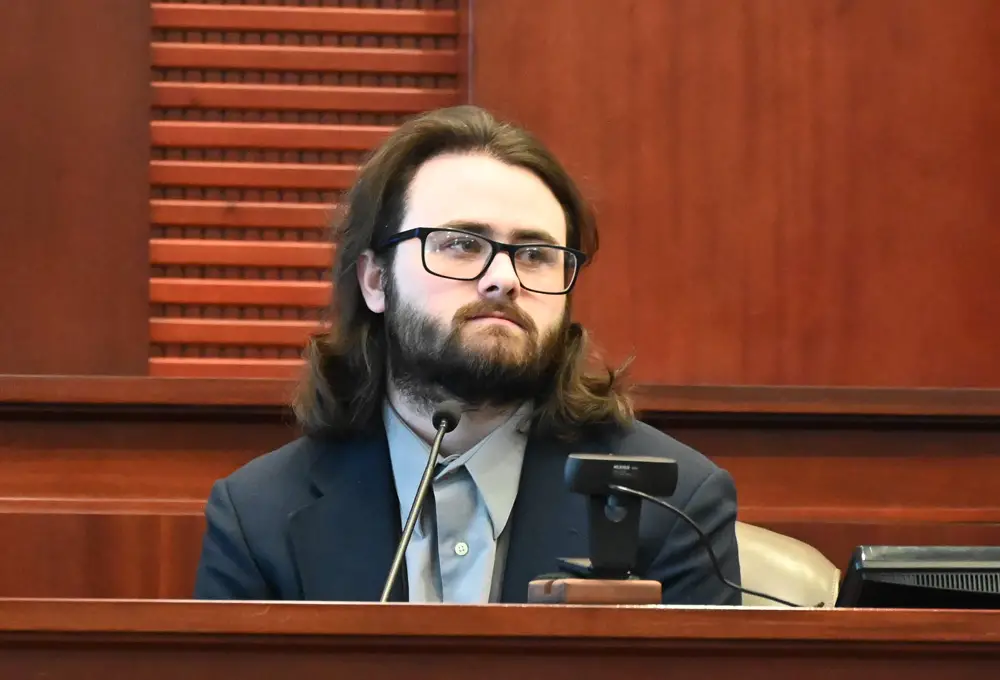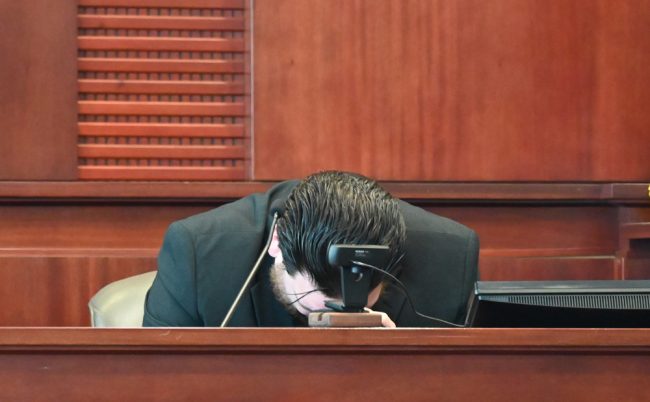
By the time 22-year-old Donald Andrew Sharp took the witness stand in his own defense this afternoon, the jury had heard five hours of devastating testimony against Sharp.
By Sharp.
The jury had heard Sharp confess to the alleged victim’s father, in a recorded two-hour phone call soaked in sobs and apologies, how he had sexually assaulted her when she was 9 at their Palm Coast home, where he was the live-in nanny for her and four siblings.
The jury had heard Sharp confess, repeatedly and in detail in a recorded three-hour interview with two Flagler County Sheriff’s detectives, how he had repeatedly sexually assaulted the girl in various ways–orally, anally, vaginally–and even, bizarrely, timed his encounters with her.
The jury had heard how he had directed the girl and her slightly older brother to engage in sexual acts with each other as Sharp watched.
That’s without counting the hours of testimony by his two victims on Tuesday in the courtroom, or the video interview of the girl by a Child Protection Team specialist, none of which drew the kind of cross-examination by Sharp’s attorney, Spencer O’Neal, that could suggest more than peripheral and ultimately irrelevant doubt about the essence of the accusations against Sharp.
Children that young often forget what took place a year or two ago. They can seem unreliable. But a few “I don’t remember” aside, the girl and the boy did not seem forgetful. The boy, now 13, was angrily, curtly self-assured, except when the questions were about his own abuse of his sister, which he did not deny. He simply melted in anguished shame before the jury and asked for a break before he could continue.
She was painfully embarrassed at what had been done to her, but just as painfully believable, the more so because even she did not fully comprehend the monstrosity of the acts allegedly forced upon her by Sharp, her alleged cousin.
So just before Sharp walked to the witness stand, the jury might have wondered what Sharp could possibly say in his own defense that could somehow exonerate him on any of the seven charges he faces, five of them capital charges, any one of which could result in a prison term for life if he is convicted.
Luckily for him, the new Florida law that calls for the restoration of executions for people found guilty of the crimes he’s accused of, that’s not a possibility: if he committed the crimes, he did so before Florida’s new law became effective. (The law, in any case, is currently unconstitutional as the reigning precedent in the land is the Supreme Court’s 5-4 ruling, in 2008, barring the execution of child rapists. But that thin majority was the work of a significantly less reactionary court than today’s.)
Perhaps Sharp could convince the jury that one or two of the charges were excessive, that he didn’t actually rape the victim vaginally, as he unquestionably did orally. But it would be pointless if he could not convincingly explain how he did not commit the other rapes, too.
O’Neal gave the jury a preview of his client’s defense. O’Neal had “reserved” his opening argument–a rare tactic in trials that can easily backfire for looking more theatrical than substantive. The prosecution and the defense usually present their opening arguments successively the first day of trial after jury selection. O’Neal chose to do so this afternoon, after the state rested, and as a preface to the defense’s only witness: Sharp.
O’Neal laid it out: the state was scapegoating Sharp. Sharp did not assault the girl. The girl’s brother and the girl repeatedly engaged in sexual acts, which Sharp attempted to stop. Sharp himself is innocent. Sharp never harmed the girl. “This case,” O’Neal told the jury, “is not about a babysitter that took advantage of the children that he was watching and making a scapegoat out of one of the children that he was watching but instead, that he is the scapegoat.”
There also was a fundamental disconnect between that theory and the case before the jury. The state’s claim that Sharp was using the abuse between the children as a scapegoat makes sense: Sharp needs a way out of the snare. He’s deflecting. Shifting blame. He has plenty of motives to do so, since all fingers point to him, including his own.
But why would the children, or the state, need a scapegoat? The children aren’t accused of anything. They never had a reason to make a case against Sharp. They have nothing to do with why he left their home after Memorial Day in 2022. He left because the children’s father was getting tired of Sharp mooching off the family, doing nothing all day, holding no job, contributing nothing to the bills even after the children’s father had remarried and his wife was home with the kids, making Sharp’s nanny services unnecessary.
The girl who was allegedly assaulted was glad he’d left, but she revealed that to her step-mom only months after Sharp’s departure, when she blurted out that he’d been inappropriate with her, setting off her parents’ immediate decision to call the cops and start an investigation. That’s what led to the father’s two-hour call to Sharp–played in its entirety to the jury–the day before the father had open-heart surgery. It was a “controlled” call, recorded by law enforcement.
“Things only happened a couple of times,” Sharp tells the father.
“What did you do? What did you do?” The father asks him. Silence. “Did you put your penis in her mouth? Did you? Andrew?” (Sharp is referred to by his middle name by family members.)
Silence. Then: “I don’t want to answer that.”
“I just need some answers, Andrew. I’ve got to call my heart doctor back.” (Even as the father was in the middle of that controlled call, his doctor was calling him.)
“I don’t know why I did what I did. I can’t–I don’t know,” Sharp says. “This will sound stupid, but I didn’t mean to do anything. I just, I don’t know why. I just–”
The father continues to try to coax further confessions out of Sharp, and succeeds: “It wasn’t much, because every time I did anything I felt–I don’t know how to describe it, it was awful, and I don’t know why I did anything,” Sharp tells the man who’d considered him like a son.
“So it was only oral? Right? Yes or no?”
“Uhuh.”
It was the same with a pair of Flagler County Sheriff’s deputies who’d traveled to Huntington, W. Va., to interview Sharop at his grandmother’s home, where he was staying after he was sent off from Florida. Only the detectives–Dan LaVerne and James Crosbee–were much more successful in their three-hour interview in weaving a spider web that ensnared Sharp in one confession after another–the oral assaults, the ejaculations, the anal rubbing, the vaginal molestation. The jury heard all three hours.
It was right after that that Sharp testified.
O’Neal asked him why he had confessed what he confessed to the girl’s father. “It seemed to me he would not believe me anymore,” Sharp said. The father was going into heart surgery. He kept asking for peace of mind. “I wanted to give him the peace of mind he sought, whether it was the truth or not.”
So Sharp thought telling him that he’d raped his 9-year-old child would give him peace of mind before his heart surgery. It appears not to have done so: the girl’s father said he “died for four minutes” in ICU after the first open-heart surgery and had to have another one. On the witness stand today, he at one point appeared as crushed as if he’d heard the news of his daughter’s rapes for the first time. Collapsing in sobs and requiring a break.

O’Neal asked Sharp why he confessed to the detectives as he did. Same story: they wouldn;t take any other answer. He wanted to go back into his grandmother’s house. So he told them what they wanted to hear–even though, as Assistant State Attorney Melissa Clark, who is prosecuting the case, several of the confessions matched the accusations the girl was making detail for detail. “Coincidence?” Clark asked Sharp.
Coincidence, Sharp told her. It was obvious by then that some of the jurors were not believing him: they were not even looking at him, as if his presence on the stand seemed superfluous to what they already knew.
“At the beginning of the interview they told me they knew what happened,” Sharp testified of the detectives. “They didn’t give me the option of: did this happen.” In fact, the detectives several times told him they did not want to put words in his mouth. They told him they knew what others had said happened, but they wanted to hear Sharp’s version, weighing every response by a truth meter of their own. They made it very clear when they thought he was lying, and when they thought he was telling the truth. Sharp made it easy for them: the difference between his lies and truth-telling was stark.
Today, he reverted to a standard defense of those who are confronting their own confessions on tape. He made those confessions to get it over with, to give the interrogators what they wanted, because they wouldn’t hear anything else.
But Sharp constantly seemed to be skating on an ice sheet thinner than implausible, as when he claimed that he repeatedly stopped the abuse between brother and sister, but never reported it to their parents (thinking it would stop, even though it didn’t). And in an entire year, only Sharp managed to catch the children in inappropriate situations, again and again, though their parents or siblings never did.
The trial day ended late this afternoon with Sharp still on the stand, under cross-examination by Clark. He’d proved ineffective in countering his own recorded confessions in the conversation with the child’s father and with detectives, that he had committed the very acts he is accused of. His testimony was to continue Thursday morning, when the defense and the prosecution are expected to present their closing arguments and the jury is to go into deliberations.
A verdict is expected Thursday. The length of the list of charges aside, it would be surprising if the jury were to take a long time to render a decision: at the end of the day, Sharp’s strongest witness against him was still Sharp.





























dave says
The state prison would be a good fit for this predator, if the court has the guts to actually send him there. In FL, A person convicted of Lewd or Lascivious Battery would be facing a maximum sentence of fifteen (15) years in prison and a minimum sentence of seven (7) years, if the child is under 12 its a Life Felony punishable by a minimum 25 year prison sentence followed by lifetime sex offender probation and a $10,000 fine.